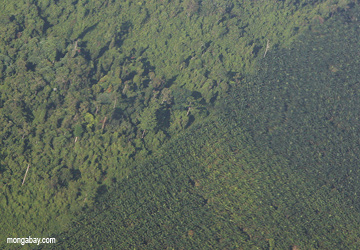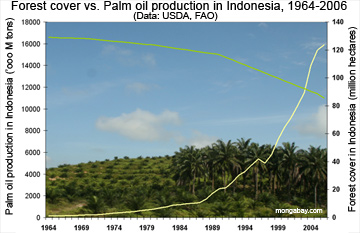Indonesia’s Riau bans destruction of rainforests and peatlands for palm oil
Indonesia’s Riau bans destruction of rainforests and peatlands for palm oil
mongabay.com
August 15, 2008
The Indonesian province of Riau on the island of Sumatra has pledged to stop destruction of its forests and carbon-rich peatlands in an effort to reduce carbon emissions from deforestation by 50 percent by 2009.
Riau Governor Wan Abu Bakar announced the temporary ban — which will remain in place until signed into law — at a ceremony in the provincial capital Pekanbaru.
“The moratorium is an important first step and an opportunity for the local government, forest communities and other stakeholders to improve forest governance,” said Arief Wicaksono, Greenpeace Southeast Asia’s Political Advisor.
Riau is seeking to cash in on the proposed REDD mechanism, a scheme that would pay countries for reducing emissions from deforestation and degradation. Other Indonesian provinces — including Papua and Aceh — are already moving forward with initiatives to avoid emissions of greenhouse gases by conserving forests. Due to forest clearing and destruction, Indonesia is the third largest emitter of greenhouse gases after the United States and China.

Oil palm plantation and logged-over forest in Borneo. Oil palm plantations are biologically impoverished relative even to heavily logged forests according to research on birds and butterflies. Environmentalists recommend restricting future expansion to pre-existing cropland and degraded habitats. |
Reining in deforestation in Riau means the province will scale back plans to triple the area of land under oil palm cultivation. Oil palm — used in the production of palm oil — is presently the largest driver of forest clearing in the province, which accounts for 25 percent of Indonesia’s oil palm estate. A study released in February estimated that deforestation of 4.2 million hectares of tropical forest and peat swamp in Riau over the past 25 years has generated 3.7 gigatons of carbon dioxide emissions. Expansion of oil palm by another 200 percent would encroach on particularly carbon-rich ecosystems, resulting in the potential emission of 14.6 billion tons of carbon, according to Greenpeace. The activist group notes that the Roundtable on Sustainable Palm Oil (RSPO) will consider a proposal to ban conversion of Southeast Asian forests for palm oil production at its annual meeting in November.
Palm oil

Forest cover versus palm oil production in Indonesia. In 2007 Indonesia overtook Malaysia as the world’s largest producer of palm oil. Together the two countries account for more than 85 percent of global production. A study published in May showed that 55-59 percent of oil palm expansion in Malaysia and at least 56 percent of that in Indonesia between 1990 and 2005 occurred at the expense of forests. |
The tripling of the price of palm oil since early 2005 has been linked to rising demand for crude oil, which has effectively driven up the price of all other vegetable oils. Producers in the U.S. and Europe have been diverting vegetable oils (canola/rapeseed and soy) and other agricultural feedstocks (especially corn) to the production of biofuels, buoying the high price for grains and oilseeds worldwide. While palm oil holds great potential as a feedstock for biodiesel production, prices are presently too high to make the process viable — roughly 80 percent of the cost of biodiesel is the price of its feedstock. As such most palm oil is currently used in food products, cosmetics, and for industrial purposes — less than one percent of Malaysia’s 2007 production was used for biodiesel. Still the industry has high hopes to eventually use more palm oil as a biodiesel feedstock.
Related articles
Orangutans persist in islands amid a sea of oil palm plantations
(7/17/2008) Orangutan are surviving in forest islands in a sea of oil palm plantations in Malaysia, reports a new survey by a government-backed conservation initiative. The finding underscores the need to protect critical forest areas for the endangered primates as forest continues to fall in southeast Asia at a rate that is the highest of any of the world’s tropical forest regions.
Indonesian palm oil firms pledge to stop clearing rainforests
(5/13/2008) Palm oil companies operating in Indonesia pledged to stop clearing forests for new plantations reports The Jakarta Post. The move is a response to growing criticism that oil palm expansion is destroying biologically-rich rainforests and contributing to global warming.
Half of oil palm expansion in Malaysia, Indonesia occurs at expense of forests
(5/20/2008) More than half of the oil palm expansion between 1990 and 2005 Malaysia and Indonesia occurred at expense of forests, reports a new analysis published in the journal conservation Letters. Analyzing data from the United Nations Food and Agriculture Organization, Lian Pin Koh and David S. Wilcove of Princeton University found that 55-59 percent of oil palm expansion in Malaysia and at least 56 percent of that in Indonesia occurred at the expense of forests. Given that oil palm plantations are biologically impoverished relative to primary and secondary forests, the researchers recommend restricting future expansion to pre-existing cropland and degraded habitats.














